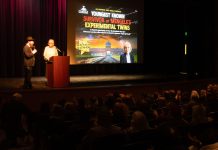Dr. Roger Lucero can’t say how many times he’s been called at 2 in the morning to give medical advice. He also can’t quantify the number of people he has helped throughout his career, only to estimate it in the “thousands and thousands.”
But that is to be expected when one has had a 38-year career such as Lucero.
Lucero, a family doctor serving Gilroy and Morgan Hill since 1983, is retiring on March 31.
“I feel so honored to be able to be a part of this medical community and do my little part in trying to help people in the community for these last 38 years,” he said. “It’s been my pleasure. I feel very honored that the community embraced me as their medical doctor.”
Lucero, who grew up in a rural community in New Mexico, said he decided at an early age that he wanted to become a family practice doctor. He worked at a nursing home to help pay his way through college, and found that he enjoyed helping others.
He earned his medical degree from the University of Washington School of Medicine and completed his residency at the University of California Davis-Contra Costa County Medical Services.
Lucero moved to Gilroy in 1983, where he purchased a family practice. His original office was located in the former Wheeler Hospital, and he served as chief of staff during the last year of its operation.
He eventually relocated to the campus of now-St. Louise Regional Hospital and later joined the El Camino Health Medical Network.
Lucero said the most rewarding part of his career comes from serving families.
“I really attach to my patients and their families,” he said. “You become a semi-family member. You deal with the trials and tribulations, and you get to help guide them through these various hurdles life throws at us.”
Now living in Morgan Hill, Lucero said he plans to pursue his hobbies, many of which had fallen by the wayside as he was focused on his career. He intends to pick up his flamenco guitar after 15 years and get back to his “mediocre” skill level, he noted, as well as travel and grow his woodworking knowledge.
“Up until about age 60, retirement was something other people did,” he said. “At age 60, you start looking at your fellow doctors and patients and realize the end is coming. You start asking questions, what am I going to do? If you are not a family doctor, who are you and what do you do?
“It was a switch that clicked off, and I realized I’ve done what I needed to do and now it’s time to do something else. I’ve got a lot of plans.”














